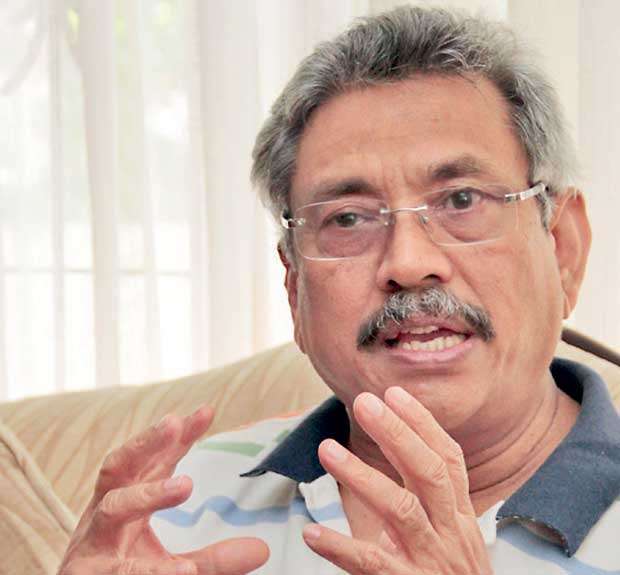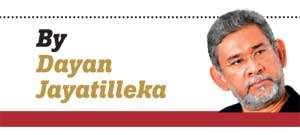01 Aug 2018 - {{hitsCtrl.values.hits}}


 n a speech to the Inter-Religious Forum on the 35th anniversary of the anti-Tamil violence of Black July ’83, former President Chandrika Bandaranaike Kumaratunga made an impassioned plea for either a new Constitution or a Constitutional Amendment to resolve the long-standing ethno-national question. The enterprise is flawed and fraught.
n a speech to the Inter-Religious Forum on the 35th anniversary of the anti-Tamil violence of Black July ’83, former President Chandrika Bandaranaike Kumaratunga made an impassioned plea for either a new Constitution or a Constitutional Amendment to resolve the long-standing ethno-national question. The enterprise is flawed and fraught.
1. Even if one assumes for the sake of argument that a new Constitution may be desirable or even ideal, this does not prove it is necessary, still less imperative.
2. It is almost certainly not the case that what CBK deems desirable or necessary is in fact politically feasible.
3. In her effort to achieve the ideal or the desirable, she may counter-productively reinforce the political, social and ideological tendencies she is seeking to combat, and wreck the laudable goal she is striving to achieve.
CBK’s ‘The Package Reloaded’ will give rise to a far more virulently nationalist regime than that of her immediate successor.
Gotabaya Rajapaksa has recently been shown on TV and quoted on a supportive website as saying to the Tamil media that “If he is President, his primary solution for the Tamil people will be to give them economic freedom.”
A leading English-language newspaper reported on Saturday, July 28, in a story entitled ‘Prez polls 2019’ that:
“Gotabhaya Rajapaksa on Thursday (July 26) told Colombo-based senior Tamil print and electronic journalists that countrywide economic empowerment was the key to post-war stability…Rajapaksa said so when the Tamil media sought his views on a gamut of issues, ranging from the status of the 13th Amendment to the Constitution enacted consequent to the Indo-Lanka Peace Accord to the government responsibility in respect of squatters…V. Thanabalasingam, former chief editor of a popular Tamil Daily and currently consultant at another reputed Tamil language newspaper, tweeted on Thursday evening that Gotabhaya said that economic empowerment of all the communities was his vision for a political solution.”
If country-wide economic empowerment was the key to post-war stability, how come the opening up of the economy and an initial 8% growth rate under President Jayewardene did not lead to political stability and could not prevent a descent into extreme conflict?
This is because, as an Asian giant with a laser-like intellect who knew everything about economic empowerment and keys to political stability, Lee Kuan Yew, repeatedly emphasized about Ceylon/Sri Lanka from the 1960s through to the post-war period (‘Conversations with Lee Kuan Yew’, Prof Tom Plate, 2010), the key to both economic and political stability in Sri Lanka was the political resolution of the underlying Tamil issue.
Instead, economic empowerment was GR’s vision for a political solution. But that’s an economic solution, not a political one.
Where’s the political component—or isn’t there one? Then why call it a ‘political solution’? Now, what happens to the political process, the process of political  dialogue?
dialogue?
Where does that leave political power-sharing, the Indo-Lanka Accord, the 13th Amendment, and indeed the entire history of 60 years of the narrative of negotiations from the Bandaranaike-Chelvanayakam Pact of 1957 which his father and cousins supported? What happens to the political content of the Tamil Question?
What of the political rights of the Tamil minority as a people, a community, a collective—the right of some measure of self-rule and self-governance, of autonomy, of irreducible political space in the contiguous areas in which they constitute a majority? This was the basis of the B-C Pact of 1957 and the Indo-Lanka Accord of 1987.
"Any attempt to roll-back devolution granted under India’s auspices will generate a shift in Tamil Nadu that will not prove inconsequential for Delhi"
GR’s statement signals the imminent end of all that. He is proposing the same thing to the Tamils that President Trump and his son-in-law Jared Kushner’s ‘Deal of the Century’ propose to -- and for -- the Palestinians: Forget political rights and claims in exchange for economic prosperity. There are no Palestinian takers. Will there be any elected Tamil political takers? Or any Indian takers?
Gotabaya’s formula for buying out Tamil political identity and the Northern Province erases the content and trajectory of Tamil political consciousness from 1949, and Indian diplomatic engagement in Sri Lanka dating back to the efforts of Indira Gandhi’s special envoy G. Parathasarathy Sr. in 1984.
It is the equivalent of the Netanyahu attempt to bury the Oslo Accords and the two-State solution. But can the paradigm shift of the Tamil Question from that of autonomous political space at the periphery to “economic empowerment/freedom”, be done unilaterally?
It is only half-correct that the TNA walked away from the negotiations with the Rajapaksa Government in 2011-2012. It was certainly the TNA that provoked the breakdown by going beyond the 13th Amendment and demanding that all State land in the Province should be used by the Centre only with the permission of the Chief Minister.
But it was the Government that paused the talks after the odious Sajin Vaas Gunawardena (who said to President Rajapaksa in my presence that he preferred to talk to Sumanthiran and not to Sampanthan because the latter “has baggage”, and MR promptly disagreed, rudely provoked Sampanthan, engineered a clash with him, planted the story in the newspapers and provoked President Rajapaksa into calling a halt to talks by giving him a distorted version of events.
The political process resumed when, after a dialogue with Japan, President Rajapaksa courageously declared elections to the Northern PC in 2013. I was present, including in the official photo-portrait on the steps, at the investiture of Justice Wigneswaran as Chief Minister in 2013.
"Gotabhaya Rajapaksa has recently been shown on TV and quoted on a supportive website as saying to the Tamil media that “If he is President, his primary solution for the Tamil people will be to give them economic freedom"
The atmosphere at the sit-down luncheon hosted by President MR with Sampanthan, Wigneswaran and Sumanthiran seated around him, signalled a fresh start.
Mr. Sampanthan told Lalith Weeratunga that if the Northern Provincial Council were allowed to function smoothly, “there could be a million Tamil votes available to President Rajapaksa”.
This, however, was not to be. The reappointment of Gen. Chandrasiri as Governor of the Northern Province even after the Northern PC election, and the protracted retention of Rear-Admiral Wijewickrema as Eastern Province Governor, despite promises made at the highest level to India not to renew their Governorship after their current terms ended, utterly vitiated the atmosphere and turned an electorally vulnerable, already porous Indian rearguard into a vanguard of a regime-change project. Colombo’s decisive strategic political mistake was made under pressure from the ‘securocracy’. The Tamil Question, like every nationality question the world over, is primarily a political question which requires a structural-reformist political solution.
"Mr. Sampanthan told Lalith Weeratunga that if the Northern Provincial Council were allowed to function smoothly, “there could be a million Tamil votes available to President Rajapaksa”.
Gotabaya’s ‘Military Wing’ or ‘ex-Military Wing’ is so strategically myopic that it doesn’t comprehend that the unilateral re-framing of and retrenchment from a political solution embedded and encased in a bilateral accord is not a viable option because Sri Lanka is near-unique in its geopolitical and geo-strategic vulnerability: it has no rearguard; no safe rear-base.
Cuba, an island, had Spanish-speaking Latin America with its progressive governments and movements as rearguard, while Pakistan and Burma/Myanmar have China as rearguard due to contiguity and overland logistical accessibility.
Sri Lanka, a small island with Tamil Nadu, an ethnic kin-state of its restive Northern populace, as an immediate neighbour, is considerably more vulnerable and requires an alliance with Delhi as a semi-rearguard or substitute rearguard, just as it imperatively requires an alliance with China as an economic powerhouse and strategic balancing factor.
Any attempt to roll-back devolution granted under India’s auspices will generate a shift in Tamil Nadu that will not prove inconsequential for Delhi.
It is exceedingly unlikely that Prime Minister Modi and India’s present generation of foreign policy managers and diplomats will wish the record to show that the reforms which two Congress administrations – led by the father and grandmother of the PM’s young challenger--and an earlier generation of diplomats secured for Sri Lanka’s Tamils were reversed and lost on their watch.
The assumption of passivity on the part of Delhi in the face of such reverses is a risk that is imprudent for any future Colombo administration to take.
27 Oct 2024 8 hours ago
27 Oct 2024 27 Oct 2024
27 Oct 2024 27 Oct 2024
27 Oct 2024 27 Oct 2024
27 Oct 2024 27 Oct 2024